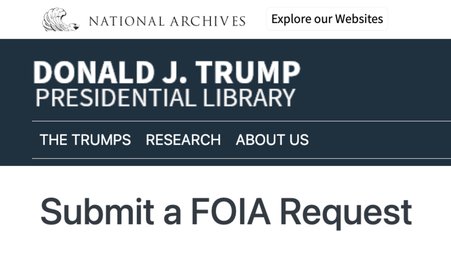Dear Friend of Press Freedom,
I’m Lauren Harper, the first Daniel Ellsberg chair on government secrecy at Freedom of the Press Foundation (FPF), and welcome to “The Classifieds.” Read on to learn more about Congress’ DOGE audit, Tulsi Gabbard’s declassification initiative, and more of this week’s top secrecy news stories.
Will GAO’s DOGE audit be hampered by FOIA firings?
The Government Accountability Office, which is Congress’ investigative agency, has been auditing the Department of Government Efficiency since March. According to Wired, GAO officials have been requesting information from the agencies DOGE has gained access to about, among other things, the “potential or actual misuse of agency systems or data” by DOGE officials.
GAO expects to complete its report by summer, and Congress intends to make its findings public.
This is a good step towards public accountability, but the thoroughness of GAO’s report may be hampered by DOGE’s activities to date.
For example, it’s not uncommon for an agency’s Freedom of Information Act office to also be responsible for responding to congressional and GAO requests. This makes sense, because FOIA requests often overlap with GAO inquiries, and FOIA officers are intimately familiar with agency records systems. But DOGE has already shuttered an alarming number of FOIA shops, and more are likely on the chopping block. How will these closures impact agencies’ ability to comply with GAO requests?
Destruction of agency records will also hamper GAO’s investigation. Agencies can’t turn over, and Congress can’t investigate, records that have already been destroyed. If March Rubio, as the acting archivist of the United States, can’t compel agencies to follow their records preservation rules or appropriately investigate when records are unlawfully destroyed, he must be replaced by someone who can.
Could this be Congress’ last chance to fix FOIA?
This week, Congress held its first hearing on the Freedom of Information Act in three years, and it was the first to feature public witnesses since 2015.
In fact, the Senate Judiciary Committee hearing didn’t hear from any federal employees at all — in large part because the Trump administration recently fired the most likely government witnesses.
The timing of the hearing raised questions about whether Congress can defend FOIA offices from the administration’s mass firings, as well as about the future of a law that has enjoyed bipartisan support for 60 years.
Read more about the hearing, the targeting of FOIA officers, and the big picture risks to the public’s right to know on our website.
Gabbard’s ‘Director’s Initiatives Group’ targets declassification
Director of National Intelligence Tulsi Gabbard has established the “Director’s Initiatives Group” to, among other things, declassify “information that serves a public interest.” The topics of public interest, at least according to the Office of the Director of National Intelligence, include “information related to COVID-19 origins, Crossfire Hurricane, Anomalous Health Incidents, the Biden Administration’s domestic surveillance and censorship actions against Americans, and more.”
It’s unclear how ODNI determined which topics to target for declassification, beyond picking issues that President Donald Trump himself has expressed an interest in.
There’s nothing wrong with the ODNI initiating declassification projects on its own, but if it wants to ensure that it’s actually declassifying records the public wants to see, it should do the following:
- Ensure that the intelligence community is processing FOIA requests efficiently and posting the released records on agency websites so all members of the public can read them.
- Solicit topics for declassification from the public and prioritize those records. This is something the National Declassification Center does with its “Indexing on Demand” program and it’s helped the NDC use its limited resources to target the records the public most wants to see.
What I’m reading
In an era of big money, the University of Illinois shrugs off rules on athletes’ NIL deals (ProPublica). An investigation by ProPublica and the Chicago Tribune, powered in part by public records requests, shows that student athletes at the University of Illinois are not fully complying with a state law that requires they disclose endorsement deals worth over $500. Troublingly, the university has fought against continued transparency around name, image, and likeness records at issue, and has “succeeded in getting a law passed that they contend exempts NIL records from the Freedom of Information Act, severely hindering any further public analysis or accountability.”
Sunshine Week, Loper Bright, and FOIA (Yale Journal of Regulation). Ryan Mulvey, who is policy counsel at Americans for Prosperity Foundation and who presently serves on the FOIA Federal Advisory Committee, has an interesting article on the potential implications of the overturning of the Chevron deference in FOIA cases — a doctrine that mandated courts defer to agencies’ interpretations of statutes they administer — specifically judicial review of agency’s use of Exemption 3.
Thanks for reading, and see you next time.
Transparently yours,
Lauren Harper
Daniel Ellsberg Chair on Government Secrecy
Freedom of the Press Foundation





